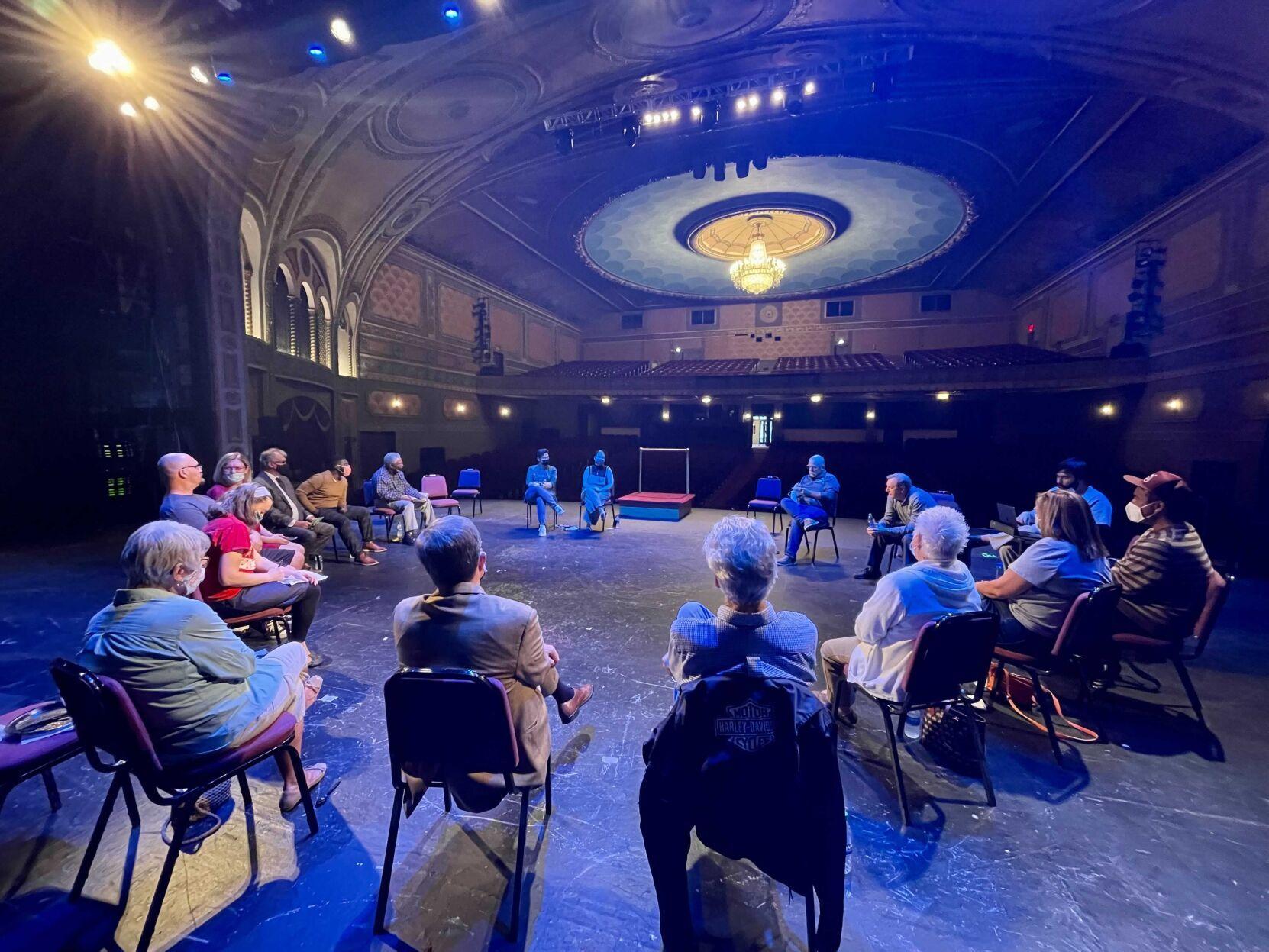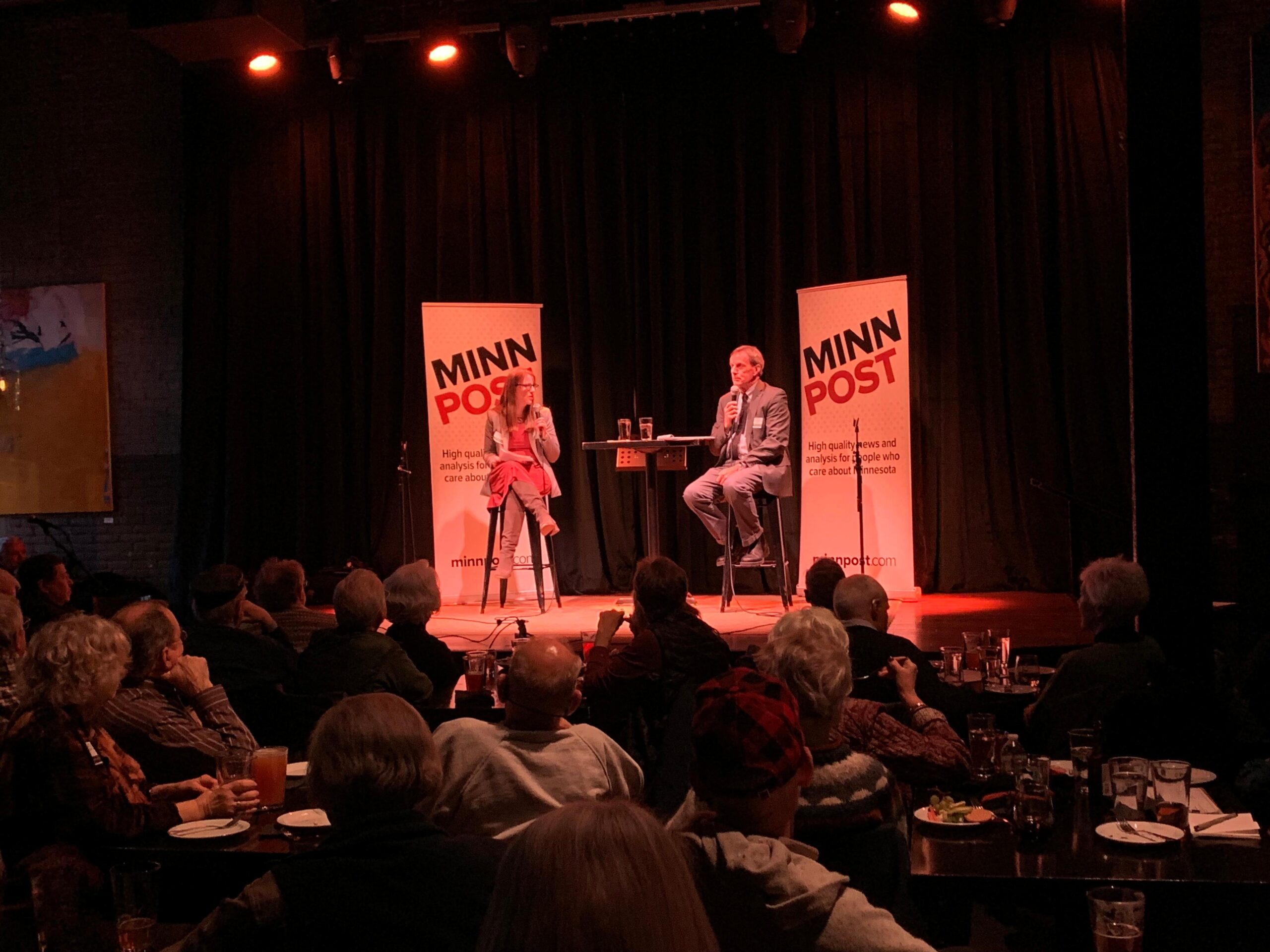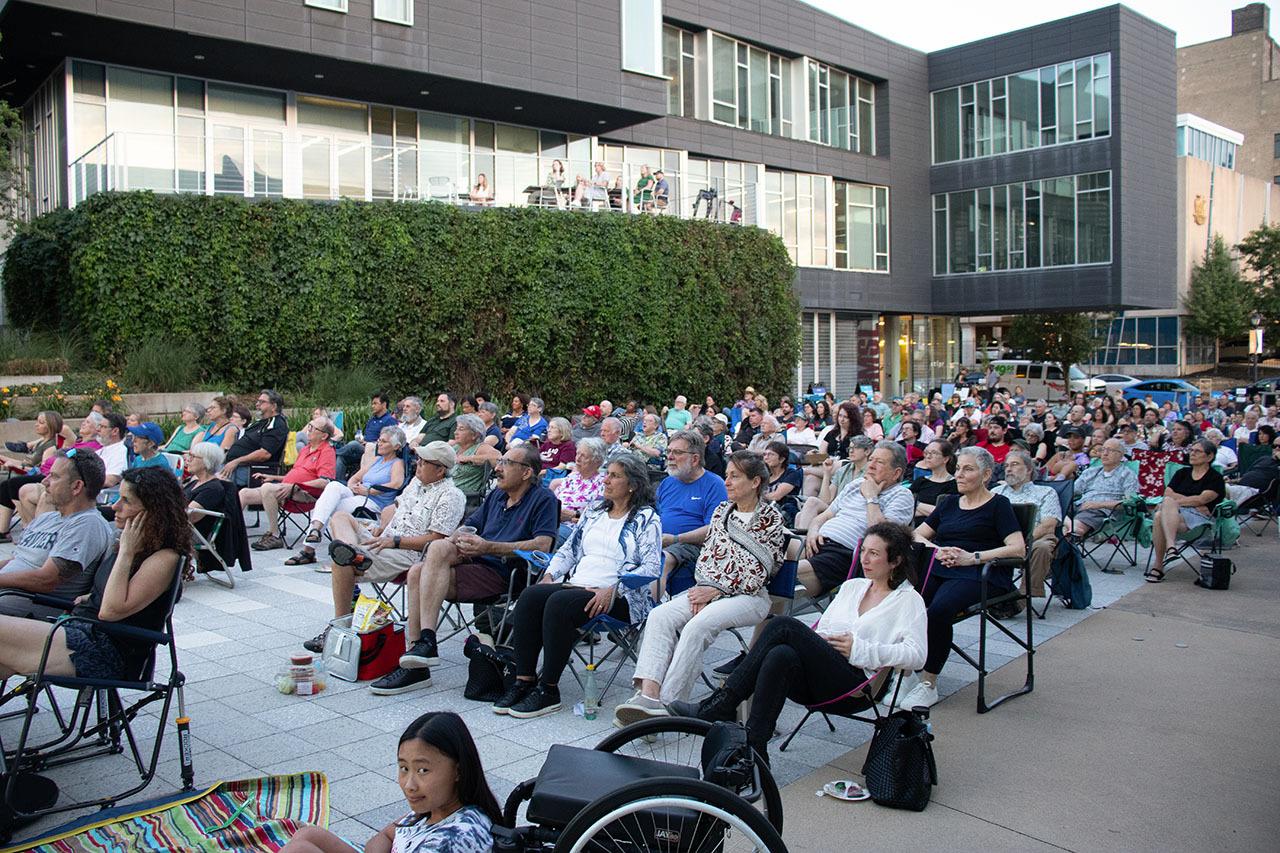Leveraging partnerships and sponsorships for journalism events
Caitlin Dewey, API's Better News,
At a "Talk The Vote" event in downtown Mansfield on Sept. 27, 2021, the Richland Source invited residents to share their thoughts and concerns about the community, which the Source later compiled into a Citizen's Agenda and shared with newly elected officials in January. (Richland Source)
Even if your live event strategy isn’t a revenue play, sponsors are crucial to covering costs and supporting long-term sustainability.This is a series on Better News to a) showcase innovative/experimental ideas that emerge from the Knight-Lenfest Newsroom Initiative and b) share replicable tactics that benefit the news industry as a whole.
This piece features tips from Brittany Schock, the audience engagement editor at Ohio’s Richland Source, and Leah Gesouras, the head of community investment at Source Media Properties, based on material they taught in the American Press Institute’s Live Events Sprint for Table Stakes Alumni in 2024. It also includes insights from Steve Shalit, the former business development director at NJ Spotlight News; Laura Lindsay, the advancement director at MinnPost; Leslie Davis, the special events director at St. Louis Public Radio; and Stephanie Rogers, the communications and engagement manager at Blue Ridge Public Radio.
More from this program:
- Sponsor pitch deck template and accompanying guide
- 6 live journalism event ideas you can replicate in your community
- A workbook to take you from journalism event idea to execution
- How to pick the right venue for your journalism event
- A spreadsheet that will help you organize research about your possible venues
- How a “run of show” document can make your journalism event a success
- A run of show template
- An event proposal template to help you get started on your next journalism event
- A checklist for marketing your live journalism events
- Using events to supercharge your election coverage
Brittany Schock, the audience engagement editor at Ohio’s Richland Source, is clear about the goals of her organization’s robust event program: make connections, build trust, foster community. It’s “not a money grab,” she said.
But since launching live events in 2017, the independent, nonprofit newsroom has routinely worked with partners and sponsors to help cover event costs, from the brewery that donates kegs for the Source’s newsroom concerts to the foundations that fund its overarching solutions journalism projects. Other outlets — including MinnPost in Minneapolis and NJ Spotlight News in Newark — have turned sponsorships from journalism-led events into bona fide revenue streams. That’s a common strategy for marketing-led events, like awards shows and conferences. But it’s also possible, albeit at a more modest scale, for in-person journalistic experiences, such as interviews or panel discussions, community conversations and resource fairs.
For sponsors, such events are a chance to enhance their community presence and align their brand with a reputable news organization. For news organizations, they’re an opportunity to showcase their journalism on a new platform, deepen their relationship with their audience and — for some outlets — add an additional revenue stream to the funding mix. But to pull off sponsorships successfully, organizations need to have a clear strategy, value-aligned partners and realistic expectations.
“You might not see a huge return on investment right away … it can take time to build and refine your product,” said Laura Lindsay, the advancement director at MinnPost, an independent, nonprofit newsroom that covers Minnesota. “But if the vision is there, and as the pieces fall into place, it becomes easier to attract sponsors.”
Covering the cost of live journalism
Journalism events are labor-intensive, time-consuming and, often, costly. That’s why even large, successful events rarely generate huge sums of money. Instead, news organizations typically view event revenue primarily as a means to cover costs. Ticket sales are one possible revenue stream; some organizations also build journalism events into their marketing budgets.
But event sponsorships are frequently the most attractive option, said Steve Shalit, who recently retired from his role as business development director at NJ Spotlight News, a multiplatform public media organization based in Newark. Sponsorships allow news organizations to keep events free, which provides greater access to their journalism and serves a public service mission. Free events also tend to draw larger audiences. And from a revenue perspective, sponsorships generate significantly more revenue than tickets can.
“Publishers might think, oh, it’s really attractive to try to get a revenue stream from attendees,” Shalit said. “But it’s not — the math doesn’t work that well, in most cases. Sponsorship dollars will greatly exceed the amount of money you can get through people paying to come in. Plus, if you keep it free, you’ll get larger audiences attracted by the content.”
The value of face-to-face connection
Despite its small staff, NJ Spotlight News hosts numerous panel discussions, roundtables and other journalism-led events each year, sometimes attracting as many as five or six sponsors to each one. The organization, which covers policy issues across New Jersey, draws an audience of politicians, advocates, wonks and other civically minded people, Shalit said. That makes NJ Spotlight News’ events an attractive messaging space for a range of large organizations that work on state policy, from local health care systems and business associations to water and energy utilities.
Community news organizations can also look to local businesses, universities and colleges, nonprofit and grant-making organizations and even private individuals. At MinnPost, Lindsay said, the same two sponsors — a wholesale electric company and an individual investment wealth advisor — have for years supported a series of casual panel discussions, called MinnPost Socials.

MinnPost Socials convene journalists and readers in a casual setting. (MinnPost)
The socials are held five times a year in a bar, brewery or other casual space, and convene MinnPost journalists to discuss topics ranging from urban development to state legislation. They typically draw about 120 people, Lindsay said: a mix of paying members, who receive free admission as a perk of membership, and members of the general public, who can purchase $10 tickets.
“When we first started, the money that we got for the sponsorship covered the cost of the event, and that was pretty much it,” Lindsay said. “Now we have multiple sponsors, and so we do earn some money on these — but it’s not huge. It mainly covers the cost of the events.”
“I would consider these more of a stewardship tactic and a way to build trust with our audience,” she added. “People have a chance to actually talk to our journalists and make that face-to-face connection.”
Long-term loyalty and trust
Importantly, that type of connection can boost both loyalty and audience revenue in the long-run, much like other engagement projects. News organizations shouldn’t discount those knock-on returns, even if they’re more difficult to observe or quantify, said Leslie Davis, the special events director at St. Louis Public Radio. The station hosts a local theater showcase and short-film screening every year, in addition to myriad panel discussions, storytelling nights and mini journalism lectures. The station spends a lot of time thinking about ways to connect its events to its journalism content, introduce attendees to journalists and hopefully reach new listeners, Davis said.

St. Louis Public Radio sees live events as a way to reach new listeners and connect existing listeners with the station’s journalism. (SLPR)
“I can’t tell you for sure if people leave an event and think, ‘man, that was really, really good — I want to make sure that St. Louis Public Radio can keep doing events like this, so I’m going to join or I’m going to up my membership or I’m going to do a one-time donation,” Davis said. “But we do believe that events are an opportunity for us to invite people in and perhaps generate donations or memberships.”
Schock, the audience engagement editor at Richland Source, also encourages news organizations to see live events not only as business strategies — but as journalistic ends in and of themselves.
“Typically when a person interacts with a journalist, it’s because they’re being interviewed — and that dynamic can be a little extractive and intimidating,” she said. ”We want the community to have a relationship with us on a deeper level than just that.”
Try these ideas
- Use storytelling to secure sponsors. The secret to booking event sponsorships isn’t going out and convincing new partners to support your organization. Instead, said Leah Gesouras, the head of community investment at Source Media Properties, which includes Richland Source, consider reaching out to businesses that already believe in your mission — then pitch them on the power of expanding that work into live journalism. “Lean on storytelling when talking to potential sponsors. Give them a vision,” she said. “And at the end of that vision, make sure they see themselves in it.”
- Consider partnerships and trades, too. They boost total revenue by reducing your costs and, in the process, make your event program more sustainable. Richland Source routinely partners with local breweries, restaurants, production companies and other vendors who provide free food and services at their events. “They really get us, and they get our vibe, and they want to be associated with our brand,” Schock said.
- Know the value of your unique audience. Whether your events draw high-powered politicos or regular people, there’s a sponsor that wants to reach them. “The people who come to events are people who go out and do things, first of all — they are people who are out and about in the community,” MinnPost’s Lindsay said. “We also have very civically engaged readers who vote and volunteer and have money to invest or donate to causes. A big part of our pitch is that we have a really high quality audience that you want to be in front of — and as a sponsor, there’s a lot of opportunities there.”
- Set clear boundaries with sponsors. Events typically involve close collaboration between editorial and business staff, and may invite some topical input from sponsors. But sponsors should understand that they are not buying access to journalists, NJ Spotlight News’ Shalit said, and that their support does not grant them any special influence in the planning of news coverage or journalism-led events. “You have to draw the line pretty hard,” he said. “Commercial interests, especially, want to worm their way in in every way possible, so as to portray themselves in the most positive fashion. But the optics and functioning of a news event must clearly demonstrate a publisher’s editorial independence.”
- Don’t overpromise deliverables. While sponsors generally expect to see their brands represented at events and in marketing materials, be careful to avoid sponsorship packages that strain staff time or resources. “When you’re promising someone … daily radio promotion, 10 social media posts and mentions in all these different newsletters, that just turns into a lot of moving parts to keep track of,” said Stephanie Rogers, the communications and engagement manager for North Carolina’s Blue Ridge Public Radio. Thoughtful, pared-down packages can still be attractive to potential sponsors.
- Talk to other news organizations about what’s working for them. St. Louis Public Radio has a robust live event program and a full-time planning staff — but Davis said she still likes to trade tips, tools and success stories with other organizations when she can. “I think there are a lot of people doing interesting stuff out there,” she said. For starters, check out the events that six local news organizations hosted as part of API’s 2024 Live Events sprint, including a trivia night, a bilingual listening session and a community picnic.